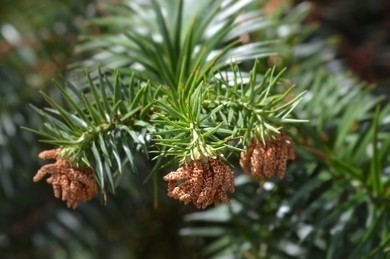Cunninghamia Plant Tissue Culture
 Leaves and inflorescences of Cunninghamia trees
Leaves and inflorescences of Cunninghamia trees
Our tissue culture technology service offers the possibility of
rapid propagation of this very versatile and excellent species.
The genus Cunninghamia belongs to the Cupressaceae family and is native to China, northern Vietnam, and Laos. Cunninghamia is an evergreen tree with a height of more than 30 m. It has the advantages of fast growth, good material, versatility, and high yield, and is one of the commercial timber and afforestation species, widely used in construction, furniture, utensils, and shipbuilding.
The root bark, bark, and leaves of Cunninghamia plants can be used as medicine to treat bruises, arthritis, and scabies.
In addition, Cunninghamia trees have straight trunks, light, and tough materials, beautiful texture, uniform structure, rapid growth, few pests and diseases, and easy processing, making them not only good timber for homes and buildings but also excellent timber for paper pulp.
Tissue culture service
Cunninghamia plants are conventionally propagated by sowing seedlings, but the rate of application of high-quality Cunninghamia plants is often limited by factors such as the source of good seeds and nursery technology. Lifeasible' application of tissue culture method for rapid propagation of good monocultures can be a complementary means for Cunninghamia research or production, and also provides the possibility of factory production of high-quality seedlings.
We can use terminal buds, stem segments, young leaves, tiller strips, good seeds, and mature conidia embryos of Cunninghamia plants as explants for primary culture.
- Adjustment of culture medium
Media selection is the key to our in vitro culture technique. The medium not only provides nutrients to the explants but also has the role of maintaining the osmotic pressure, pH, and water of the plant cells. Differences in the basic medium and differences in the types and concentrations of plant growth regulating substances produce different effects on the induction of differentiation, proliferation culture, and strong rooting of the same explants. During rapid propagation, we will adjust the composition of the medium according to the culture's purpose to meet the nutritional requirements of the culture at different growth periods.
Our application of tissue culture technology can not only effectively overcome some defects in the traditional nursery of Cunninghamia plants, but also play a role in maintaining the excellent traits of the parental species in breeding asexual seedlings, which is conducive to the large-scale production of excellent asexual seedlings of Cunninghamia plants as a means of commercial production to meet the huge demand for Cunninghamia seedlings in the market and an important way to preserve the germplasm and asexual lines of the species.
You want to sign a confidentiality agreement.
You have a specific plant species for your experimental needs.
You have a reliable and relevant cooperation project to discuss.
You are very interested in our project or have any questions.
You need an updated and detailed quotation.
For research or industrial use.

 Leaves and inflorescences of Cunninghamia trees
Leaves and inflorescences of Cunninghamia trees
